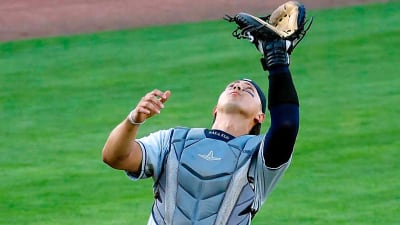
The Toronto Raptors’ second unit feels different this year.
With experienced young players who spent multiple years in college and a defense-first identity, the bench looks deeper and more dependable than it has in seasons past. It has the potential to become a real weapon for Toronto, the kind of advantage the Raptors have not enjoyed in years.
But talk of another Bench Mob is still far too premature.
That label belongs to the 2017–18 group, a unit that remains one of the greatest collections of young bench talent in NBA history. Fred VanVleet, Pascal Siakam, Jakob Poeltl, Delon Wright, CJ Miles, and Norman Powell gave Toronto an advantage every night. They did not just hold their own against starters, they often swung games, fueling one of the most successful regular seasons in franchise history.
“That group was so special,” Powell said Friday while in Toronto for a Skechers event. “You look at the players then and where we’re at now. I mean, it’s hard to recreate that. I think for us, what made it so special was the experience, not just NBA years, but just life experience. You got older guys, guys that stayed four years, undrafted, … and CJ coming in from Indiana, having that veteran presence off the bench. … It’s hard to recreate that.”
This year’s bench does share some of that DNA. Jamal Shead and Jonathan Mogbo are both entering their sophomore seasons after four years in college, bringing polish and poise rarely seen in second-year players. Ja’Kobe Walter is also back for his sophomore campaign after a one-and-done season at Baylor and a late-season surge in minutes with Toronto.
Gradey Dick, now in his third year, gives the group another young but established option, having started for Toronto last season. Rookie ninth pick Collin Murray-Boyles arrives after two years at South Carolina, while Alijah Martin joins the group fresh off a five-year career that culminated in a national championship at Florida. To round it out, the Raptors added 26-year-old Sandro Mamukelashvili, a steady veteran who brings an extra layer of experience to a team still in transition.
The results last season did not flatter the reserves. Toronto’s bench finished with a -3.1 net rating, one of the league’s worst, though that number was skewed by the Raptors’ late-season focus on development. At Summer League, however, there were signs of progress. Toronto went undefeated in round robin play, with its future bench unit leading the charge behind a defense-first approach. Scoring consistently remains the question, but the framework is in place for this group to play winning minutes.
Powell said there was a moment when the old Bench Mob realized it was different.
“When you put our bench in and still compete with some of the top starting units in the league, and we would still keep pace, or we’d go on a huge run to be the difference of the game, I think that’s when you start to realize, like, this is something special,” he said.
The energy around that team became a movement. The Bench Mob had handshakes, T-shirts, and a swagger that captured the city.
“I’ll have to go back and look at some benches in NBA history, but I think so,” Powell said of their legacy. “I would put us up there within the top three, top five of all time, for sure.”
That is the standard.
This year’s Raptors bench has depth, maturity, and the potential to grow into a real strength. But comparing it to the Bench Mob is like comparing any young scorer to Michael Jordan. It may end up good, maybe even very good, but expecting it to ever be that good again is an unfair bar.
For now, the Raptors should be content with something far more modest: a bench that can compete, hold leads, and give the starters a break. After years of searching, that alone would be progress.
More must-reads:
- Lakers get encouraging Luka Doncic injury update
- Browns officially make decision on starting quarterback
- The 'Second-overall NFL Draft picks' quiz
Breaking News
Trending News
Customize Your Newsletter
 +
+
Get the latest news and rumors, customized to your favorite sports and teams. Emailed daily. Always free!








